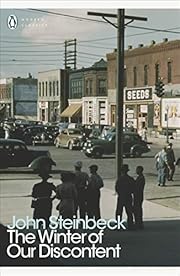
I am not sure John Steinbeck would approve of my saying this but to me his books are comfort reads. Not because his books set out to fill me with a warm fuzzy feeling. And not because Steinbeck’s protagonists are shining examples of successful individuals who are something to aspire to.
Steinbeck manages to tell stories of individuals who, even though they may be flawed, are trying to do right. Some succeed at it better than others – think of Lenny and George in Of Mice and Men or Tom Joad in The Grapes of Wrath. All of them struggle against their peers and against the circumstances in which they find themselves and neither of them triumphs over the adversity they are faced with. And nevertheless, it gives me comfort to read about the tenaciousness and decency with which Steinbeck’s protagonists pursue their quests.
The Winter of Our Discontent deals with the same struggle of an essentially decent and righteous Ethan Hawley against a number of his peers who seem to have gained advantages on him through corruption and deceit.
Day after day Ethan is confronted with the loss of his family’s fortune and social status, and Ethan cannot help but believe that his descent into obscurity was brought about by his own refusal to participate in greed and ruthlessness until one day he tries to acknowledge to himself that:
“In business and in politics a man must carve and maul his way through men to get to be King of the Mountain. Once there, he can be great and kind— but he must get there first.”
Without revealing too much of the ensuing story, Ethan’s decision to join the rat race has an effect on him, his family and everyone around him and consequences which he could not have foreseen.
In contrast to other of Steinbeck’s books, I was a little disappointed with the twist that follows Ethan’s decision to claim his share of the wealth that has by-passed his family.
It was almost, like Karma stepped in where Ethan strayed from his path – and this somewhat took away from the story I expected because Ethan no longer seemed to be in charge of his own fate.
As The Winter of Our Discontent was Steinbeck’s last novel, it made me think whether he had finally given up the idea of there being any spirit of humanity left in his protagonists and whether the intervention of fate was a sign of resignation in his original belief that people are essentially decent.
3.5* (out of 5*)

I may have mentioned this before, but John Steinbeck was a friend of my husband’s family (his great uncle Bob was Steinbeck’s college roommate). Steinbeck is a brilliant storyteller, but I confess it took me reaching adulthood to appreciate him. I think we do our youth a disservice when we introduce them to Steinbeck via “The Pearl,” which is just a painful read (IMO). I haven’t read “Winter of Our Discontent,” but I will be.
LikeLiked by 1 person
I’m not sure that you have mentioned it. How exciting! Any fun stories?
I actually came to Steinbeck when I was in high school but I read of Mice and Men before we got to it in class. I read a lot of classics in my teens and outside of school requirements, so I guess I was an outlier.
It was not until much later that I read The Pearl and I am still baffled as to why you would throw this at teenagers as part of a curriculum. (We didn’t read it at school, we did Of Mice and Men, but then it does no good to compare set texts between US schools and Germany.)
I think Steinbeck worked better for me in “my youth”, which is when I binged his works. Re-reads haven’t been great successes for me. Tho, there are aspects that I appreciate more now. I guess, it is the same with many books.
Does it work the other way around for you? What did you appreciate about his writing more as an adult than as a youth?
LikeLiked by 1 person
All I could see as a teen was the misery. It took reading “Cannery Row” and “Tortilla Flat,” then “Travels with Charley,” to see the hope and optimism.
“Travels with Charley” brings me to one of my favorite stories. In the introduction, Steinbeck refers to “wintering at a Tahoe estate.” It was my husband’s family cabin at Fallen Leaf Lake. There is a photo taken there, with Uncle Bob, and Steinbeck holding my late father-in-law when Dan was an infant.
LikeLiked by 1 person
That is such a cool story. 🙂
I hear you about the misery. I don;t know, but I saw some glimpses of hope in Grapes of Wrath, too, but there were only just enough to keep reading. I ended up loving the book because of them.
LikeLiked by 1 person